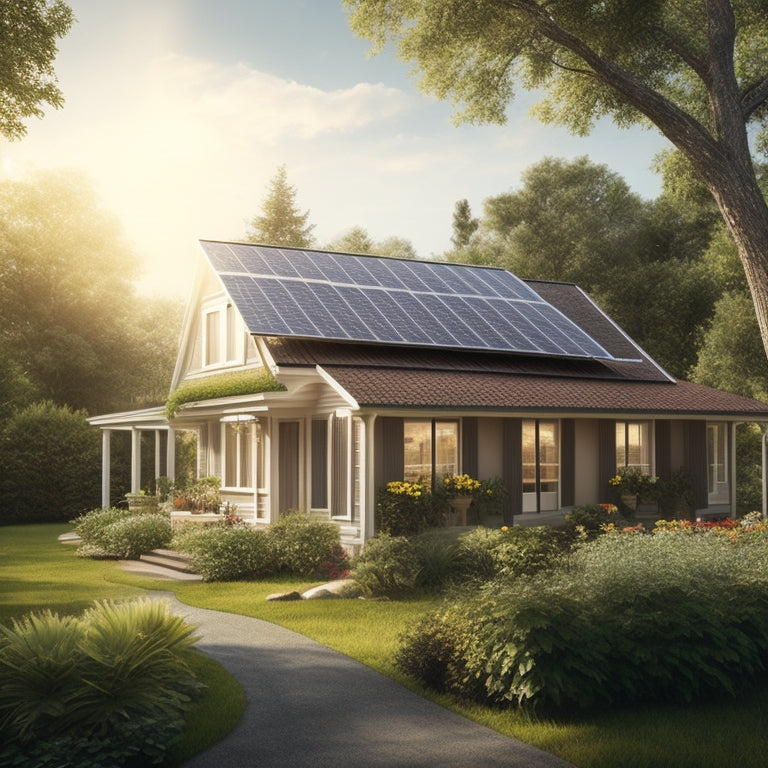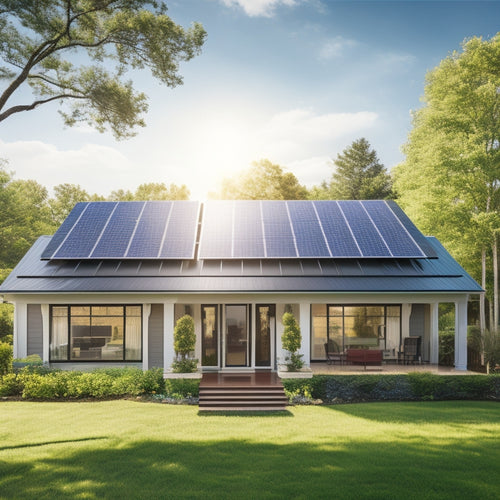
What Is Solar Home Energy Independence?
Share
You're taking control of your energy needs by utilizing the power of the sun, and with solar home energy independence, you can break free from reliance on traditional utility companies and generate your own clean, sustainable energy. This means being self-sufficient, relying on renewable energy sources, and having control over your energy needs. By installing solar panels and energy storage solutions, you can reduce your energy costs, lower your carbon footprint, and enhance your energy security. As you investigate this concept further, you'll uncover the benefits of achieving true energy freedom and how it can change your daily life.
Overview
- Solar home energy independence is the ability to generate and use solar energy without relying on the grid for power.
- It reduces energy costs, lowers carbon footprint, and enhances energy security for homeowners.
- Advances in solar panel efficiency and energy storage solutions have made it a growing trend among environmentally conscious homeowners.
- Government rebates and tax credits are available to incentivize homeowners to adopt solar installations and achieve energy independence.
- Energy storage solutions, such as batteries, are crucial to store excess energy generated by solar panels for later use.
Defining Energy Independence
Your home's electricity meter, once a constant reminder of reliance on the grid, can become a relic of the past as you strive for energy independence.
You're taking the first step towards breaking free from the constraints of traditional energy sources. Energy independence is about achieving energy autonomy, where you generate your own power and reduce your reliance on the grid.
With the help of high-efficiency solar charging solutions, you can maximize your energy harvest and reduce your carbon footprint. It's about self-sufficiency, where you're no longer bound by the whims of utility companies.
By shifting to renewable energy sources, you're taking control of your energy needs and reducing your reliance on the grid, much like off-grid power systems that guarantee continuous power supply during low sunlight.
With energy independence, you're not just saving money; you're gaining freedom from the grid and becoming a more sustainable, eco-friendly homeowner.
Benefits of Solar Power Systems
Achieving energy independence with solar power systems comes with a multitude of benefits that make it an attractive option for homeowners. You'll enjoy financial savings through reduced energy bills and potential solar incentives. Solar power systems also provide a clean and renewable source of energy, reducing your environmental impact.
| Benefits | Description | Impact |
|---|---|---|
| Financial Savings | Reduced energy bills and solar incentives | Lower energy costs |
| Environmental Impact | Renewable technology reducing carbon footprint | Cleaner air and water |
| Energy Efficiency | Optimized energy production and grid integration | Increased energy independence |
| Installation Process | Streamlined process with policy support | Easier adoption |
| Maintenance Costs | Minimal maintenance required for solar panels | Reduced upkeep expenses |
How Solar Energy Storage Works
You're likely wondering how you can guarantee a steady supply of energy when the sun isn't shining. This is where Energy Storage Systems (ESS) come in, allowing you to store excess energy generated by your solar panels during the day for use at night or during power outages.
By carefully selecting solar panels and considering factors such as energy usage, battery capacity, and local climate conditions off-grid system sizing, you can maximize your energy independence.
With a battery backup power system, you can enjoy uninterrupted energy independence, even when the grid goes down.
Energy Storage Systems
Solar energy storage systems have become an essential component of modern solar power systems, enabling homeowners to tap into the energy generated by their solar panels during the day and store it for later use. This allows you to maximize your energy efficiency and reduce your reliance on the grid. With energy storage, you can optimize your solar technology to provide sustainable living and energy resilience.
| Benefits | Features | Advantages |
|---|---|---|
| Renewable Incentives | Grid Integration | Cost Savings |
| Energy Resilience | Battery Lifespan | Environmental Impact |
| Off-Grid Solutions | Advanced Solar Technology | Increased Freedom |
Battery Backup Power
By incorporating energy storage systems into your solar power setup, you're able to capture the energy generated during the day for later use.
This is where battery backup power comes in, providing you with a reliable source of energy when the sun goes down or during power outages.
When selecting a solar battery brand, consider top-rated brands like Tesla and LG for reliability and durability.
With advanced solar battery technology, you can store excess energy generated during the day and use it at night or during emergencies.
This energy management system allows you to have control over your energy usage, reducing your reliance on the grid and giving you the freedom to use energy on your own terms.
With a battery backup system, you'll have peace of mind knowing you have a steady supply of energy, whenever you need it.
Key Components of Solar Systems
Utilizing the power of the sun requires a well-designed solar system, comprising several key components that work together in harmony.
You'll need to take into account the type of solar panels that best suit your energy needs, as different types offer varying levels of efficiency and durability. Installation costs will also vary depending on the quality and quantity of panels you require.
Additionally, an inverter is necessary to convert DC power from the panels into usable AC power for your home. A mounting system securely fastens the panels to your roof, and a monitoring system tracks your energy production and consumption.
With these components working together, you'll be well on your way to utilizing the power of the sun and achieving energy independence.
Achieving True Energy Freedom
You're on the path to achieving true energy freedom by breaking free from the grid, utilizing a renewable energy source that's clean and sustainable.
With a well-designed solar system, you can generate all the energy you need, reducing your reliance on external power sources.
Break Free From Grid
Embracing energy independence means severing ties with the grid, and that's exactly what achieving true energy freedom is all about.
You're taking control of your energy needs, reducing your reliance on public utilities, and adopting sustainable living practices. By investing in solar panels and off-grid solutions, you're securing your energy future and minimizing your environmental impact.
The energy shift is underway, and you're at the forefront, exploring grid alternatives that guarantee energy autonomy and utility independence.
With solar incentives and government-backed initiatives, the change to energy freedom has never been more accessible.
Renewable Energy Source
Take the first step towards achieving true energy freedom by utilizing the power of renewable energy sources.
You're making a conscious decision to reduce your reliance on fossil fuels and tap into the clean energy of the sun.
With advancements in solar panel efficiency, you can generate a significant portion of your energy needs.
Renewable energy policies also support your shift, offering incentives and tax credits to offset the initial investment.
By leveraging these benefits, you're well on your way to achieving energy independence.
As you reduce your carbon footprint, you'll enjoy the peace of mind that comes with knowing you're contributing to a sustainable future.
Zero Energy Bills
Utilizing the full potential of solar energy allows homeowners to break free from the shackles of monthly utility bills, achieving true energy freedom.
You can eliminate or drastically reduce your energy bills by utilizing the power of the sun. With solar financing options available, you can install a solar panel system that meets your energy needs without breaking the bank.
By combining solar energy with energy efficiency measures, such as insulation and energy-efficient appliances, you can maximize your energy independence.
Imagine not receiving an electricity bill every month, and instead, generating your own clean energy. That's the reality of zero energy bills, and it's within your reach.
Overcoming Energy Reliability Concerns
As you shift to solar home energy independence, guaranteeing a reliable energy supply becomes a top priority.
You want to guarantee that your solar panels can generate enough power to meet your energy needs, even during periods of low sunlight or power outages.
To overcome energy reliability concerns, you can invest in energy storage solutions like batteries, which store excess energy generated by your solar panels during the day for use during the night or when the grid is down.
This approach enhances solar reliability and energy resilience, providing you with a steady supply of power when you need it most.
Frequently Asked Questions
Can I Use Solar Power During a Grid Outage?
You can use solar power during a grid outage if you have a solar battery, which provides energy storage, allowing you to access power even when the grid is down, giving you independence and freedom from utility outages.
How Long Do Solar Panels Last on Average?
You're investing in solar panels, and you're wondering how long they'll last. On average, solar panels last around 25-30 years, but their longevity depends on factors like quality, maintenance, and environmental conditions, which can impact their overall lifespan.
Are Solar Panels Affected by Weather Conditions?
You're about to uncover a truth that'll blow your mind: solar panels are affected by weather conditions, but not as drastically as you think! In reality, solar panel efficiency drops only slightly due to weather impact, ensuring a steady flow of clean energy for your freedom-loving lifestyle.
Can I Sell Excess Energy Back to the Grid?
You can sell excess energy back to the grid through net metering, which tracks your production and consumption, offering benefits like reduced utility bills. You'll need energy storage options to maximize returns, ensuring you're in control of your energy usage and costs.
Do Solar Panels Require Regular Maintenance?
You'll need to perform routine checks on your solar panels, ensuring they're clean to maximize energy production, and schedule inverter maintenance to prevent system failures, but don't worry, these tasks are relatively simple and infrequent.
Ready to Buy
You've made it to the finish line! Now that you know what solar home energy independence is, you might be wondering, "But what about those cloudy days or power outages?" Fear not! With advanced energy storage systems, you can store excess energy generated by your solar panels during the day and use it at night or during outages, ensuring a reliable supply of power. Take the first step towards true energy freedom and start designing your solar-powered future today!
Related Posts
-

Smart Home Thermostats to Revolutionize Your Space
Smart home thermostats revolutionize your space by providing precise temperature control and optimizing energy saving...
-

Replacing Old Appliances With Sustainable Alternatives
Replacing old appliances with sustainable alternatives can change your home into an energy-efficient space. Not only ...
-

Home Solar Installation Cost
You're considering installing solar panels on your home, and the upfront cost is likely the biggest hurdle standing i...


